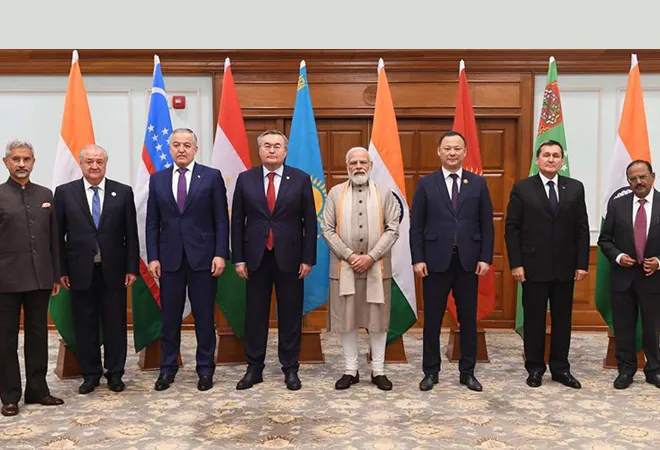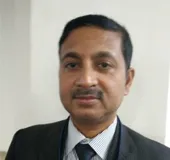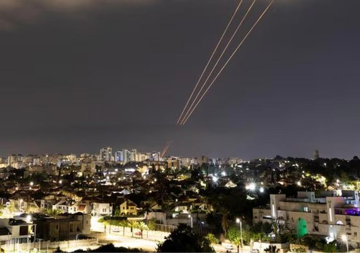
India and Central Asia have had longstanding historical, cultural, political, and economic relations that have over the time metamorphosed into a stable, mature, and transformational partnership. India’s proximity and growing convergence on issues of mutual concern with the five Central Asian countries—comprising Kazakhstan, Kyrgyzstan, Tajikistan, Turkmenistan, and Uzbekistan—have been reflected in heightened cooperation in addressing emerging geostrategic challenges in the wake of the COVID-19 pandemic and the changing world order. Concurrently, the two sides have enhanced deliberations and cooperation on areas such as trade and connectivity, economic development, development partnership, energy security, regional issues of mutual interests as well as the mutual geopolitical concerns of each side on emerging challenges in Afghanistan.
The two sides further reiterated commitment towards building robust cooperation in addressing emerging global concerns while emphasising the ardent need to promote security, stability, and long-term shared economic prosperity in the India-Central Asia geopolitical architecture.
During the third India-Central Asia Dialogue recently held in New Delhi on 19 December 2021, the two sides further reiterated commitment towards building robust cooperation in addressing emerging global concerns while emphasising the ardent need to promote security, stability, and long-term shared economic prosperity in the India-Central Asia geopolitical architecture. Prime Minister Narendra Modi’s historic visit, in July 2015, to all five Central Asian countries—marking the first time an Indian PM has gone to all five countries in a single visit since their independence in the early 1990s—was a turning point in reinvigorating the socio-politico-economic tie between the two sides. In consideration of the heightened activism distinctly visible in the India–Central Asia corridor in recent years, it can be argued that New Delhi’s push and leadership in rejuvenating strategic convergence between the two sides is destined to provide a much-needed equilibrium in India’s extended western neighbourhood. This could, hopefully, lead to effectively containing provocative posturing from any side, while enhancing the efficacy of reformed multilateralism and transparency of global governance.
The third India-Central Asia Dialogue held recently has had a catalytic effect because of consolidation between the two sides, especially in the context of rapidly changing geopolitical fault-lines in regional and transglobal dimensions, the initiation of joint celebrations marking the 30th anniversary of diplomatic relations between India and the Central Asian countries in 2022, the emerging imbroglio in Afghanistan that falls in the backyard of each side, and the changing dimensions of the COVID-19 pandemic. The meeting further explored new vistas of cooperation based on mutual interests and the need to deepen strategic engagement in the “4cs”—commerce, capacity building, connectivity, and contact—that encompass the contours of security and terrorism, trade and economy, development partnership, energy security, healthcare, and climate change. Even Prime Minister Modi emphasised the importance that New Delhi attaches to its long-standing connectivity ties with the Central Asian countries while reiterating the commitment towards enhanced politico-economic integration in India’s “extended neighbourhood”.
The meeting further explored new vistas of cooperation based on mutual interests and the need to deepen strategic engagement in the “4cs”—commerce, capacity building, connectivity, and contact—that encompass the contours of security and terrorism, trade and economy, development partnership, energy security, healthcare, and climate change.
The Dialogue identified key areas of strategic engagement towards enhancing defence and security ties, economic and connectivity initiatives, and energy cooperation, particularly in the context of frank and cordial deliberations on issues related to India’s US $1 billion Line of Credit for projects in Central Asia, connectivity endeavours by using the Chabahar Port for enhancing trade between the two sides, and the Turkmenistan-Afghanistan-Pakistan-India (TAPI) gas pipeline. The two sides agreeing to continue developing the transit and transport potential in conjunction with improving the logistics network of the region was another milestone development. Concurrently, the meet formally touched upon the optimum usage of the International North-South Transport Corridor (INSTC) in conjunction with Ashgabat Agreement on International Transport and Transit Corridor (ITTC) to enhance connectivity between India and the Central Asian countries.
Regarding the security paradigm, the two sides fully recognised the strategic imperatives for a peaceful, stable, and prosperous Afghanistan especially in the context of the nation’s close geographical proximity not only to India but also the fact that it shares land borders with three Central Asian countries—Tajikistan, Turkmenistan, and Uzbekistan. Keeping in perspective the potential danger and consequences of the spill-over effect of terrorism into the extended neighbourhood, the Joint Statement of the Ministers stressed upon:
“the formation of a truly representative and inclusive government, combating terrorism and drug trafficking, central role of the UN, providing immediate humanitarian assistance for the Afghan people and preserving the rights of women, children and other national ethnic groups.”
The unanimous consensus and reaffirmation of the strategic significance of UNSC Resolution 2593 (2021) “which unequivocally demands that Afghan territory not be used for sheltering, training, planning or financing terrorist acts and called for concerted action against all terrorist groups” was another major aspect that is expected to shape the trajectory of future consultations and action plans on the Afghanistan situation. Continuing to address the scourge of global terrorism, the meeting called upon the international community to work constructively in strengthening the UN-led global counter-terrorism cooperation, while expressing urgency towards fully implementing the relevant UNSC resolutions that define the Global Counter-Terrorism Strategy and FATF standards. In essence, the message coming out of the New Delhi Dialogue is loud and unequivocal. It effectively showcases the strong resolve of India and its Central Asian partners to work in concert towards ensuring geostrategic equilibrium in the extended neighbourhood.
On the energy security frontier, the India-Central Asia Dialogue reiterated longstanding commitment towards capacity building and connectivity enhancement between the two sides. While New Delhi understands and appreciates the significant endowment of energy related natural resources in Central Asia, especially in the context of large reserves of coal, gas, mineral resources, and crude oil, the meet extensively deliberated on heightened collaboration towards enhancement of trade relations on energy resources between the two sides. Enhanced cooperation between specialised national institutions in areas of renewable energy and information technology is a welcome step towards energy cooperation.
Continuing to address the scourge of global terrorism, the meeting called upon the international community to work constructively in strengthening the UN-led global counter-terrorism cooperation, while expressing urgency towards fully implementing the relevant UNSC resolutions that define the Global Counter-Terrorism Strategy and FATF standards.
Dealing with COVID-19, while the Central Asian countries appreciated India’s assistance in supply of COVID-19 vaccines and essential medicines during their early stage of the pandemic, New Delhi reciprocated by expressing gratitude for the medical supplies received from Kazakhstan and Uzbekistan and the offer of assistance made by Turkmenistan during the second wave of COVID-19 in India in April-May 2021. Significant strides towards vaccine dose sharing, technology transfer, local production capacity enhancement, promotion of supply chains for medical products coupled with price transparency are going to be impactful. Concurrently, expansion of trade and economic engagement delineates strong solidarity to achieve full trade potential in critical sectors like pharmaceuticals, information technology, agriculture, energy, textiles, gems and jewellery, among others. The move towards establishing direct linkages between the states of India and different regions of Central Asian countries through the establishment of twinning/partnership relations between them is destined to be monumental in scaling trade dynamics.
Overall, in recent years, the contours of the India-Central Asia relationship have been witnessing metamorphosis in an unprecedented manner whereby growing convergence has the potential to bring abut a paradigm shift in the geostrategic dynamics of the extended neighbourhood. The transformational impact from the visit of Indian Prime Minister Narendra Modi in July 2015 has been further energised by repeat high level exchange visits at various levels—all of which have further consolidated the upswing of strategic ties. The very fact that the foreign ministers of the five Central Asian nations visited New Delhi in December 2021 to attend the third India-Central Asia Dialogue despite the threat of the Omicron variant while side-tracking the overlapping meeting of foreign ministers of the Organisation of Islamic Cooperation bears testimony to the importance they accord to relations with India.
The views expressed above belong to the author(s). ORF research and analyses now available on Telegram! Click here to access our curated content — blogs, longforms and interviews.




 PREV
PREV


